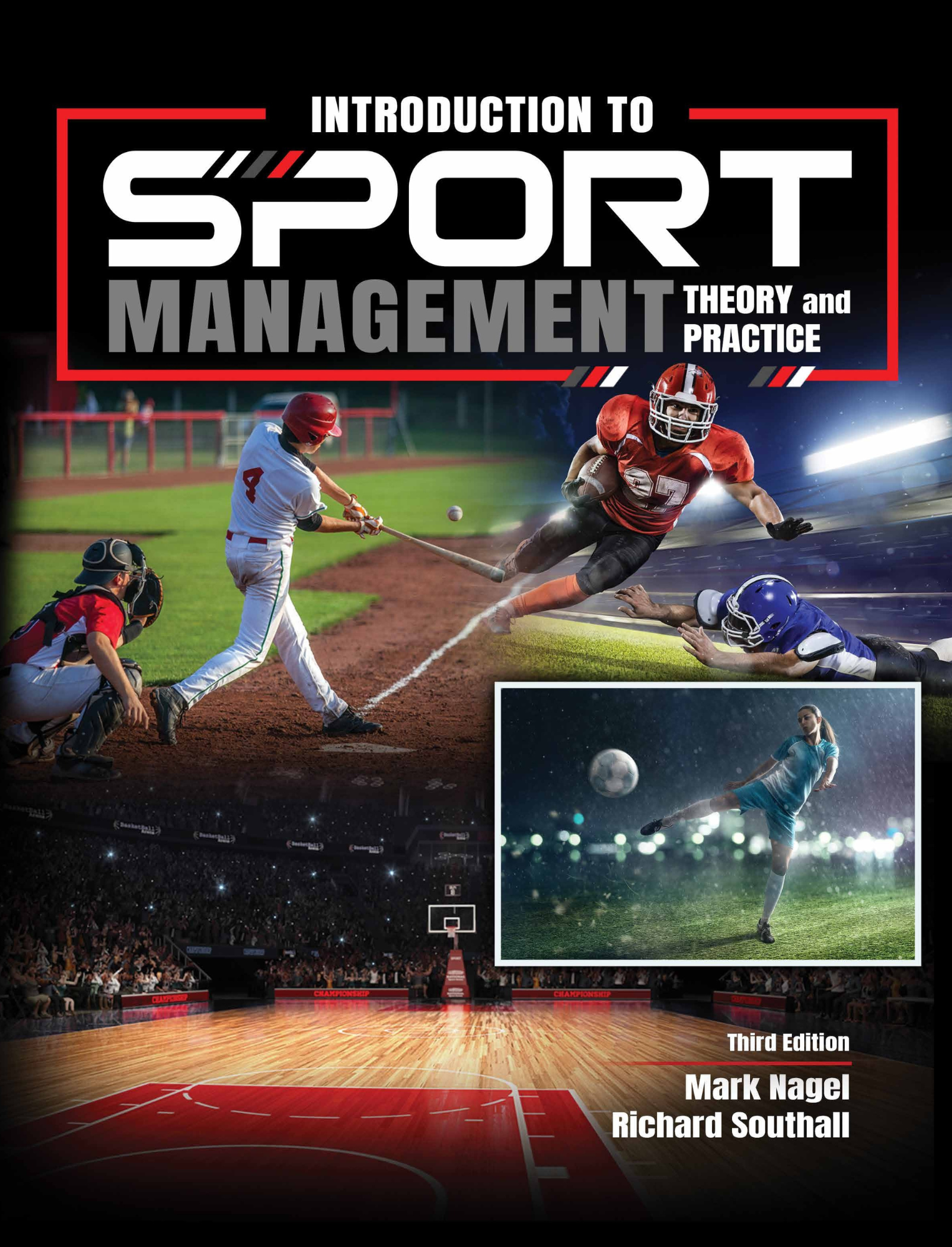Introduction to Sport Management: Theory and Practice
Author(s): Mark Nagel , Richard Southall
Edition: 3
Copyright: 2024
Pages: 620
Edition: 3
Copyright: 2024
Pages: 620
Choose Your Platform | Help Me Choose
Introduction to Sport Management: Theory and Practice bridges the theoretical-practical divide by providing students with practical perspectives on today’s sport management issues, based upon sound theoretical frameworks. Introduction to Sport Management introduces readers to the complex nature of today’s sport industry and offers advice from sport-industry insiders.
Introduction to Sport Management: Theory and Practice:
- features unique perspectives from a wide range of contributing authors and interviewees.
- introduces fundamental sport management subtopics that form the basis for many of the courses students will take in their program of study.
- guides students through the wide array of sport management opportunities and helps launch their sport management career.
- contains practitioner interviews that reinforce the theoretical principles found in each chapter and provide outstanding career advice.
Preface
CHAPTER 1: Do You Really Want to Work in the Sport Industry?
Mark Nagel and Richard Southall
Chapter Objectives
Key Terms
Introduction
Going Pro in Something Other Than Sport
Where Theory and Practice Lead to Action
Integration of Sport-Management Functional Areas
Conclusion
Interviews
Interview 1.1 Todd Koesters
Interview 1.2 Chip Wile
References
CHAPTER 2: Sociocultural Aspects of Sport
Richard Southall and Crystal Southall
Chapter Objectives
Key Terms
Introduction
A Sociocultural Examination of Sport
Cultural Hegemony
Sociological Theories and Practical Applications
Approaches to Sport Socialization
A Multiple-Perspective Approach?
Examining Sport Organizations and Sport as an Institution
Conclusion
Study Questions
Learning Activity
References
CHAPTER 3: The U.S. Sport Industry
Mark Nagel
Chapter Objectives
Key Terms
Introduction
Professional Sport
College Sport
Youth Sports
Olympic Sports
Sport Facilities
Licensed Merchandise
Sport Media
Sports Agents
Athlete Foundations
Sport Tourism
Employment Placement
Sport Sponsors
Conclusion
Interviews
Interview 3.1 Tom Regan
Interview 3.2 Jeremy Jordan
Learning Activity
References
CHAPTER 4: Sport in the Global Marketplace
Ronald L. Mower
Chapter Objectives
Key Terms
Introduction
Basic Theories in the Globalization Debate
The Global Sporting Goods Trade: Postindustrialism, Transnational Corporations, and the Rise of Global Branding and Sponsorship
Global Sport Media: Mega-Events and Mass Entertainment Spectacles
Conclusion
Interviews
Interview 4.1 Colin Blount
Interview 4.2 Eric Bruzzone
Interview 4.3 Ahmed Khellil Abbassi
Study Questions
Learning Activities
References
Suggested Readings
CHAPTER 5: Critical Thinking and Ethical Decision Making
Richard Southall
Chapter Objectives
Key Terms
Introduction
Reasoning and Critical Thinking
Deductive and Inductive Reasoning
Critical Thinking versus Truth
What Is Ethics?
Four-Part Ethical-Reasoning Model
Obstacles to Ethical Decision Making
Cultural Relativism
Some Frameworks for Ethical Reasoning
Conclusion
Interview
Interview 5.1 Jon Ericson
Study Questions
Learning Activities
References
Suggested Sources
CHAPTER 6: Legal Aspects of Sport
Mark S. Nagel
Chapter Objectives
Key Terms
Introduction
Overview of Negligence Law
Overview of Contract Law
Constitutional Law
Other Areas of Sport Law
Conclusion
Interview
Interview 6.1 Scott Bearby
Study Questions
Learning Activities
Questions
References
CHAPTER 7: Congressional Influence in the Sport Industry
Martin Gold and Howard Liebengood and Mark Nagel
Chapter Objectives
Key Terms
Introduction
What Is Congress?
Understanding the Legislative Process
Congress Passes Sports Legislation
Regulatory Authority
Congress Influences the Private Sector
Congress and the States
Conclusion
Interview
Interview 7.1 Anne Marie Turner
Study Questions
Learning Activities
References
CHAPTER 8: Strategic Management
Deborah A. Yow, William W. Bowden, and Jesse Kasser
Chapter Objectives
Key Terms
Introduction
The Function of Management
The Importance of the Strategic-Planning Process and an Explicit Strategic Plan in Sport Management
Conclusion
Interview
Interview 8.1 Martina K. Ballen
Interview 8.2 Deana Barnes
Study Questions
References
CHAPTER 9: Sport Marketing
Matthew J. Bernthal
Chapter Objectives
Key Terms
Introduction
Definitions of Marketing and Sport Marketing
Market Segmentation
The Interconnectedness of Segmentation Bases
Relationship Marketing
Branding and Positioning
External Contingencies
The Marketing Plan
Conclusion
Interviews
Interview 9.1 Mike Boykin
Interview 9.2 Eric Nichols
Study Questions
Learning Activities
References
Suggested Sources
CHAPTER 10: Sport-Sales and Revenue Generation
Richard Southall and Ronald Dick
Chapter Objectives
Key Terms
Introduction
What Is Selling?
The Sales-Training Process
The Sales Process
Sport-Sales Prospecting Sources
Techniques to Alleviate and Mitigate Client Concerns
Conclusion
Interviews
Interview 10.1 Jim Van Stone
Interview 10.2 Jennifer Hale Holman
Study Questions
Learning Activities
Culminating Activity
References
CHAPTER 11: Sport Communication
Alan Zaremba
Chapter Objectives
Key Terms
Introduction
What is Sport Communication?
Academic Research
Conclusion
Interviews
Interview 11.1 Cassandra Zebisch
Interview 11.2 Leland Barrow
Study Questions
Learning Activities
References
CHAPTER 12: Facility Management
Jason Simmons
Chapter Objectives
Key Terms
Introduction
History of Sport Facilities
Types of Facilities
Risk Management
Revenue Sources
Operations
Conclusion
Interviews
Interview 12.1 Craig and Paul Lovett
Interview 12.2 Rebecca M. Nicholson
Study Questions
Learning Activities
References
CHAPTER 13: Sport Finance
Timothy Koba
Chapter Objectives
Key Terms
Introduction
Finance
Basic Finance and Accounting Concepts
Income Statement
Financing the Operation of a Sport Organization
Sources of Revenue
Conclusion
Interviews
Interview 13.1 Daniel Barrett
Interview 13.2 Gina Rosser Bradley
Study Question
Learning Activities
References
Suggested Sources
CHAPTER 14: esports
Mark Nagel, Chris Scroggins and Kenny Sugishita
Chapter Objectives
Key Terms
Introduction
Ecosystem
Key Issues in Esports
Career Opportunities
Chapter Summary
Interview
Interviews 14.1 Don Marinelli
Study Questions
Learning Activities
References
CHAPTER 15: Interviews
Betsy Sedlak
Sundeep Kapur
Steve Fanelli
Sarah Haile
Che Mock
Madeline Hooper
Brent Koonce
Shawni Sullivan
Jamie Pardi
Dawn Ridley
Malcolm Bordelon
Tamlyn Horne
Damon Dukakis
Clara Ríos Grisi
Danny Noll
Mike Nutter
Greg Turner
Chrissy Baines
Charles Waddell
Damon Zumwalt
Terumi Kaibara
Dan Hazlett
Sally Roach
Andrew Muscato
Chris May
Piper Brewster
Scott Pederson
Alex Barbarian
Ricky Lefft
Bill Shanahan
CHAPTER 16: Sport-Management Resources
Mark Nagel
Introduction
Academic Organizations and Conferences
Professional Organizations
Professional Periodicals and Blogs
Academic Journals
Sport-Management Topics
Resources and Literature Specific to Certain Sports
Other Helpful Links
INDEX
Dr. Mark S. Nagel is presently a professor of Sport and Entertainment Management at the University of South Carolina. He is also the Associate Director of the College Sport Research Institute (CSRI) at The University of South Carolina. He also serves as an adjunct faculty member at the University of San Francisco (USF), St. Mary’s College of California, and the IE Business School in Madrid, Spain. He is a former treasurer of the Sport and Recreation Law Association and the North American Society for Sport Management. Prior to working in academe, Dr. Nagel held numerous positions in sport management including campus recreation and athletic coaching. He was an assistant coach with the USF women’s basketball team that advanced to the NCAA Tournament Sweet 16 in 1996.
Dr. Nagel has previously coauthored three other widely utilized textbooks, Financial Management in the Sport Industry, Sport Facility Management: Organizing Events and Mitigating Risks, and Developing Successful Sport Sponsorship Plans. He has authored/coauthored over 40 peer-reviewed articles, 10 academic book chapters, and 20 articles in professional journals. In addition, he has contributed to multiple technical/research reports and wrote the Legal Guidelines and Professional Responsibilities chapter in the American Council on Exercise (ACE) Personal Trainer Manual, ACE Health Coach Manual, and the ACE Group Fitness Instructor Manual.
Dr. Richard M. Southall is a Professor in the Department of Sport and Entertainment Management at University of South Carolina. He is also Director of the College Sport Research Institute (CSRI) at the University of South Carolina. CSRI sponsors the annual CSRI Conference on College Sport and the Journal of Issues in Intercollegiate Athletics.
Dr. Southall teaches courses in college sport, sport business ethics, event management, and management theory.
He has disseminated his research, which examines the National Collegiate Athletic Association’s (NCAA) Collegiate Model of Athletics, in more than 100 commentaries, book chapters, and journal articles in such publications as The Chronicle of Higher Education, College Athletics Clips, Ethnic and Racial Studies, International Sports Law Journal, Journal of Issues in Intercollegiate Athletics, Journal of the Legal Aspects of Sport, Journal of Sport Management, Journal of Sport and Social Issues, Sociology of Sport Journal, and Sport Marketing Quarterly. Dr. Southall has given more than 150 national and international presentations. He is co-author of Introduction to Sport Management: Theory and Practice (2nd ed.), and Sport Facility Management: Organizing Events and Mitigating Risks (3rd ed.).
A recognized expert on NCAA “big-time” college-sport, he has been quoted in such news outlets as The Chronicle of Higher Education, insidehighered.com, The New York Times, USA Today, The Washington Post, ESPN Outside the Lines, The Wall Street Journal, Time and CNN.
Dr. Southall was a consultant for the plaintiffs in the 2009-2016 O’Bannon v. NCAA litigation. In July 2014 he testified before the U.S. Senate Committee on Commerce, Science, & Transportation during a hearing on the safety and well being of college athletes.
Introduction to Sport Management: Theory and Practice bridges the theoretical-practical divide by providing students with practical perspectives on today’s sport management issues, based upon sound theoretical frameworks. Introduction to Sport Management introduces readers to the complex nature of today’s sport industry and offers advice from sport-industry insiders.
Introduction to Sport Management: Theory and Practice:
- features unique perspectives from a wide range of contributing authors and interviewees.
- introduces fundamental sport management subtopics that form the basis for many of the courses students will take in their program of study.
- guides students through the wide array of sport management opportunities and helps launch their sport management career.
- contains practitioner interviews that reinforce the theoretical principles found in each chapter and provide outstanding career advice.
Preface
CHAPTER 1: Do You Really Want to Work in the Sport Industry?
Mark Nagel and Richard Southall
Chapter Objectives
Key Terms
Introduction
Going Pro in Something Other Than Sport
Where Theory and Practice Lead to Action
Integration of Sport-Management Functional Areas
Conclusion
Interviews
Interview 1.1 Todd Koesters
Interview 1.2 Chip Wile
References
CHAPTER 2: Sociocultural Aspects of Sport
Richard Southall and Crystal Southall
Chapter Objectives
Key Terms
Introduction
A Sociocultural Examination of Sport
Cultural Hegemony
Sociological Theories and Practical Applications
Approaches to Sport Socialization
A Multiple-Perspective Approach?
Examining Sport Organizations and Sport as an Institution
Conclusion
Study Questions
Learning Activity
References
CHAPTER 3: The U.S. Sport Industry
Mark Nagel
Chapter Objectives
Key Terms
Introduction
Professional Sport
College Sport
Youth Sports
Olympic Sports
Sport Facilities
Licensed Merchandise
Sport Media
Sports Agents
Athlete Foundations
Sport Tourism
Employment Placement
Sport Sponsors
Conclusion
Interviews
Interview 3.1 Tom Regan
Interview 3.2 Jeremy Jordan
Learning Activity
References
CHAPTER 4: Sport in the Global Marketplace
Ronald L. Mower
Chapter Objectives
Key Terms
Introduction
Basic Theories in the Globalization Debate
The Global Sporting Goods Trade: Postindustrialism, Transnational Corporations, and the Rise of Global Branding and Sponsorship
Global Sport Media: Mega-Events and Mass Entertainment Spectacles
Conclusion
Interviews
Interview 4.1 Colin Blount
Interview 4.2 Eric Bruzzone
Interview 4.3 Ahmed Khellil Abbassi
Study Questions
Learning Activities
References
Suggested Readings
CHAPTER 5: Critical Thinking and Ethical Decision Making
Richard Southall
Chapter Objectives
Key Terms
Introduction
Reasoning and Critical Thinking
Deductive and Inductive Reasoning
Critical Thinking versus Truth
What Is Ethics?
Four-Part Ethical-Reasoning Model
Obstacles to Ethical Decision Making
Cultural Relativism
Some Frameworks for Ethical Reasoning
Conclusion
Interview
Interview 5.1 Jon Ericson
Study Questions
Learning Activities
References
Suggested Sources
CHAPTER 6: Legal Aspects of Sport
Mark S. Nagel
Chapter Objectives
Key Terms
Introduction
Overview of Negligence Law
Overview of Contract Law
Constitutional Law
Other Areas of Sport Law
Conclusion
Interview
Interview 6.1 Scott Bearby
Study Questions
Learning Activities
Questions
References
CHAPTER 7: Congressional Influence in the Sport Industry
Martin Gold and Howard Liebengood and Mark Nagel
Chapter Objectives
Key Terms
Introduction
What Is Congress?
Understanding the Legislative Process
Congress Passes Sports Legislation
Regulatory Authority
Congress Influences the Private Sector
Congress and the States
Conclusion
Interview
Interview 7.1 Anne Marie Turner
Study Questions
Learning Activities
References
CHAPTER 8: Strategic Management
Deborah A. Yow, William W. Bowden, and Jesse Kasser
Chapter Objectives
Key Terms
Introduction
The Function of Management
The Importance of the Strategic-Planning Process and an Explicit Strategic Plan in Sport Management
Conclusion
Interview
Interview 8.1 Martina K. Ballen
Interview 8.2 Deana Barnes
Study Questions
References
CHAPTER 9: Sport Marketing
Matthew J. Bernthal
Chapter Objectives
Key Terms
Introduction
Definitions of Marketing and Sport Marketing
Market Segmentation
The Interconnectedness of Segmentation Bases
Relationship Marketing
Branding and Positioning
External Contingencies
The Marketing Plan
Conclusion
Interviews
Interview 9.1 Mike Boykin
Interview 9.2 Eric Nichols
Study Questions
Learning Activities
References
Suggested Sources
CHAPTER 10: Sport-Sales and Revenue Generation
Richard Southall and Ronald Dick
Chapter Objectives
Key Terms
Introduction
What Is Selling?
The Sales-Training Process
The Sales Process
Sport-Sales Prospecting Sources
Techniques to Alleviate and Mitigate Client Concerns
Conclusion
Interviews
Interview 10.1 Jim Van Stone
Interview 10.2 Jennifer Hale Holman
Study Questions
Learning Activities
Culminating Activity
References
CHAPTER 11: Sport Communication
Alan Zaremba
Chapter Objectives
Key Terms
Introduction
What is Sport Communication?
Academic Research
Conclusion
Interviews
Interview 11.1 Cassandra Zebisch
Interview 11.2 Leland Barrow
Study Questions
Learning Activities
References
CHAPTER 12: Facility Management
Jason Simmons
Chapter Objectives
Key Terms
Introduction
History of Sport Facilities
Types of Facilities
Risk Management
Revenue Sources
Operations
Conclusion
Interviews
Interview 12.1 Craig and Paul Lovett
Interview 12.2 Rebecca M. Nicholson
Study Questions
Learning Activities
References
CHAPTER 13: Sport Finance
Timothy Koba
Chapter Objectives
Key Terms
Introduction
Finance
Basic Finance and Accounting Concepts
Income Statement
Financing the Operation of a Sport Organization
Sources of Revenue
Conclusion
Interviews
Interview 13.1 Daniel Barrett
Interview 13.2 Gina Rosser Bradley
Study Question
Learning Activities
References
Suggested Sources
CHAPTER 14: esports
Mark Nagel, Chris Scroggins and Kenny Sugishita
Chapter Objectives
Key Terms
Introduction
Ecosystem
Key Issues in Esports
Career Opportunities
Chapter Summary
Interview
Interviews 14.1 Don Marinelli
Study Questions
Learning Activities
References
CHAPTER 15: Interviews
Betsy Sedlak
Sundeep Kapur
Steve Fanelli
Sarah Haile
Che Mock
Madeline Hooper
Brent Koonce
Shawni Sullivan
Jamie Pardi
Dawn Ridley
Malcolm Bordelon
Tamlyn Horne
Damon Dukakis
Clara Ríos Grisi
Danny Noll
Mike Nutter
Greg Turner
Chrissy Baines
Charles Waddell
Damon Zumwalt
Terumi Kaibara
Dan Hazlett
Sally Roach
Andrew Muscato
Chris May
Piper Brewster
Scott Pederson
Alex Barbarian
Ricky Lefft
Bill Shanahan
CHAPTER 16: Sport-Management Resources
Mark Nagel
Introduction
Academic Organizations and Conferences
Professional Organizations
Professional Periodicals and Blogs
Academic Journals
Sport-Management Topics
Resources and Literature Specific to Certain Sports
Other Helpful Links
INDEX
Dr. Mark S. Nagel is presently a professor of Sport and Entertainment Management at the University of South Carolina. He is also the Associate Director of the College Sport Research Institute (CSRI) at The University of South Carolina. He also serves as an adjunct faculty member at the University of San Francisco (USF), St. Mary’s College of California, and the IE Business School in Madrid, Spain. He is a former treasurer of the Sport and Recreation Law Association and the North American Society for Sport Management. Prior to working in academe, Dr. Nagel held numerous positions in sport management including campus recreation and athletic coaching. He was an assistant coach with the USF women’s basketball team that advanced to the NCAA Tournament Sweet 16 in 1996.
Dr. Nagel has previously coauthored three other widely utilized textbooks, Financial Management in the Sport Industry, Sport Facility Management: Organizing Events and Mitigating Risks, and Developing Successful Sport Sponsorship Plans. He has authored/coauthored over 40 peer-reviewed articles, 10 academic book chapters, and 20 articles in professional journals. In addition, he has contributed to multiple technical/research reports and wrote the Legal Guidelines and Professional Responsibilities chapter in the American Council on Exercise (ACE) Personal Trainer Manual, ACE Health Coach Manual, and the ACE Group Fitness Instructor Manual.
Dr. Richard M. Southall is a Professor in the Department of Sport and Entertainment Management at University of South Carolina. He is also Director of the College Sport Research Institute (CSRI) at the University of South Carolina. CSRI sponsors the annual CSRI Conference on College Sport and the Journal of Issues in Intercollegiate Athletics.
Dr. Southall teaches courses in college sport, sport business ethics, event management, and management theory.
He has disseminated his research, which examines the National Collegiate Athletic Association’s (NCAA) Collegiate Model of Athletics, in more than 100 commentaries, book chapters, and journal articles in such publications as The Chronicle of Higher Education, College Athletics Clips, Ethnic and Racial Studies, International Sports Law Journal, Journal of Issues in Intercollegiate Athletics, Journal of the Legal Aspects of Sport, Journal of Sport Management, Journal of Sport and Social Issues, Sociology of Sport Journal, and Sport Marketing Quarterly. Dr. Southall has given more than 150 national and international presentations. He is co-author of Introduction to Sport Management: Theory and Practice (2nd ed.), and Sport Facility Management: Organizing Events and Mitigating Risks (3rd ed.).
A recognized expert on NCAA “big-time” college-sport, he has been quoted in such news outlets as The Chronicle of Higher Education, insidehighered.com, The New York Times, USA Today, The Washington Post, ESPN Outside the Lines, The Wall Street Journal, Time and CNN.
Dr. Southall was a consultant for the plaintiffs in the 2009-2016 O’Bannon v. NCAA litigation. In July 2014 he testified before the U.S. Senate Committee on Commerce, Science, & Transportation during a hearing on the safety and well being of college athletes.





